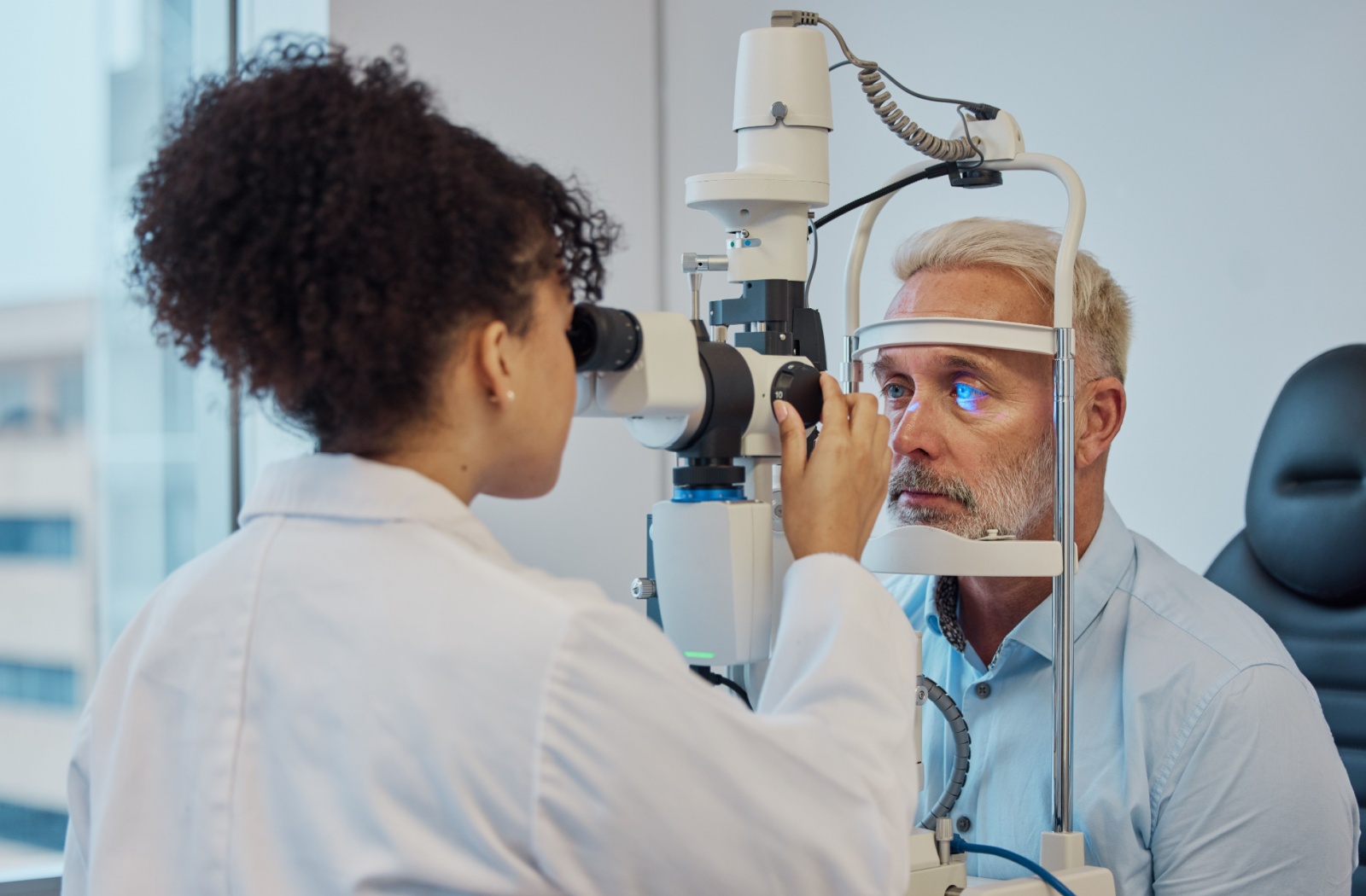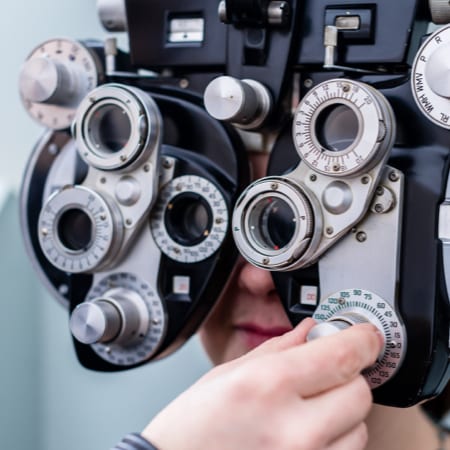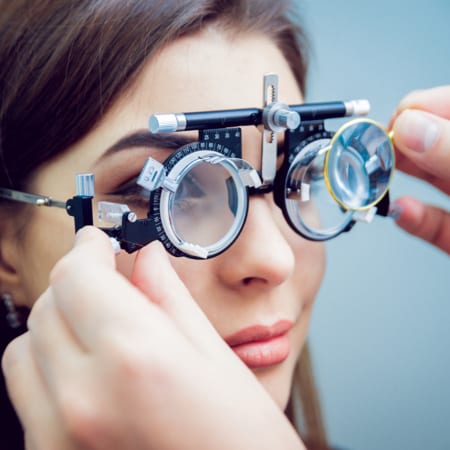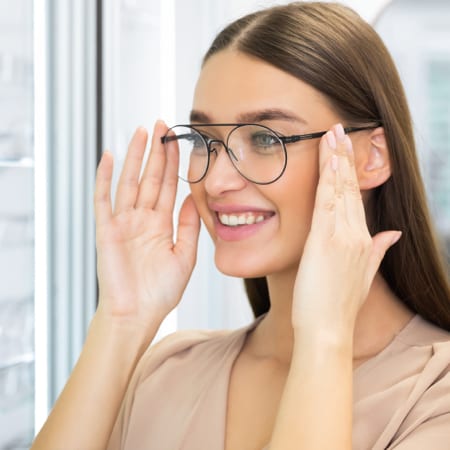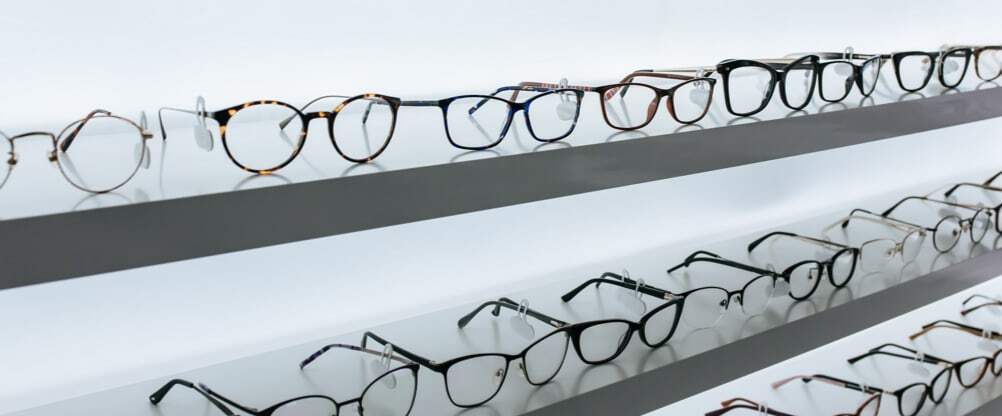Age-related macular degeneration (AMD) is one of the leading causes of vision loss, particularly among adults over 50. While it might sound intimidating, there’s good news—there are steps you can take to help prevent macular degeneration or lower your risk of significant vision loss.
Although macular degeneration can’t be entirely prevented, there are steps you can take to lower your risk and help slow its progression. With healthy lifestyle choices, like eating a healthier diet and quitting smoking, combined with professional care and supplemental treatments, it’s possible to manage the condition and support your eye health over time.
What Is Age-Related Macular Degeneration?
AMD is a progressive eye condition affecting the macula, a small but vital part of the retina. The macula controls central vision, which allows us to read, recognize faces, and see fine details. Damage to this area can lead to blurry or distorted vision and, over time, significant vision loss.
There are 2 types of macular degeneration you should be aware of: dry and wet.
Dry Macular Degeneration
This is the most common form of macular degeneration, making up about 90% of cases. It occurs when macular tissue thins over time. Vision loss usually progresses slowly, so it may not be obvious in the early stages. Early detection is crucial to prevent significant vision loss.
Wet Macular Degeneration
This less common but more severe form occurs when abnormal blood vessels grow beneath the retina, leaking fluids and causing faster and more significant vision loss. Immediate medical attention is essential for managing wet macular degeneration.
Symptoms & Risk Factors
Knowing the symptoms and risk factors of macular degeneration can help you spot it early and take steps to lower your risk. Common symptoms include:
- Blurred or distorted central vision
- Difficulty reading or seeing fine details
- Trouble recognizing faces
- Shadows or “blank spots” in the centre of your vision
Risk Factors to Watch For
While some risk factors for macular degeneration are beyond your control, others can be addressed with lifestyle changes.
- Age: The risk increases significantly after age 50.
- Family history: A family history of macular degeneration can increase your risk.
- Smoking: Smokers are up to 4 times more likely to develop macular degeneration.
- Poor diet: A lack of leafy greens and other nutrient-rich foods can contribute to eye health problems.
- UV exposure: Prolonged exposure to harmful UV rays can accelerate macular damage.
- High blood pressure (hypertension): Poor vascular health can negatively impact the delicate tissue of the macula.
Lifestyle Changes to Help Prevent AMD
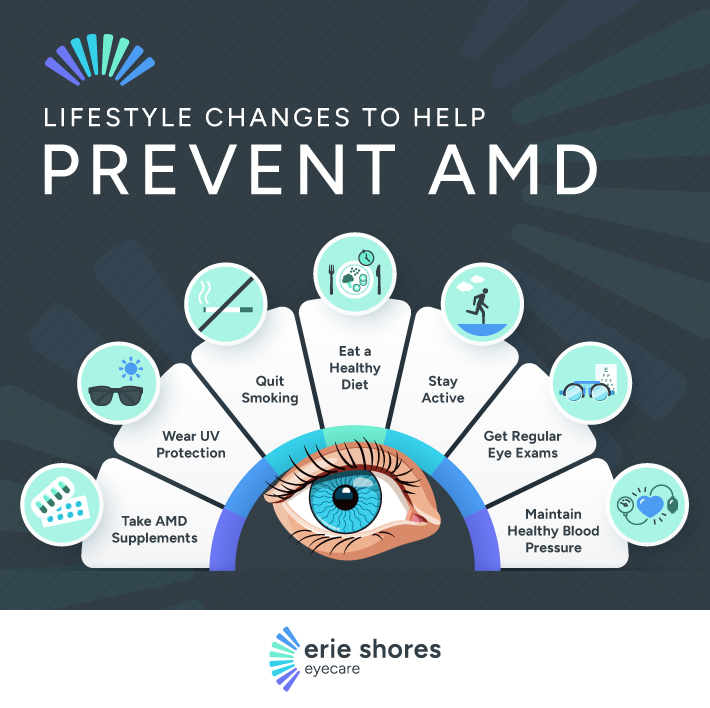
While it’s not always possible to completely prevent macular degeneration, adopting a few healthy habits can lower your risk and even slow its progression.
Focus on a Nutrient-Rich Diet
Your diet plays a major role in your overall eye health. Include the following nutrients in your meals to help keep your macula healthy:
- Leafy greens: Spinach, kale, and collard greens are rich in lutein and zeaxanthin, nutrients known for supporting eye health.
- Omega-3 fatty acids: Found in salmon, walnuts, and flaxseeds, omega-3s can help protect your vision.
- Vitamins C and E: Citrus fruits and almonds are excellent sources of these antioxidants, which combat oxidative damage.
Quit Smoking
One of the most impactful ways to lower your risk for macular degeneration is to quit smoking. Smoking not only damages your overall health but also directly harms the delicate blood vessels in your eyes.
If quitting has been difficult for you, contact a healthcare provider for resources and support—it’s worth it for your vision and health.

Protect Your Eyes from UV Rays
Ultraviolet (UV) rays from the sun can contribute to macular damage over time. Wear sunglasses that offer 100% UV protection whenever you’re outdoors. Don’t forget a wide-brimmed hat on especially sunny days for extra coverage.
Maintain Healthy Blood Pressure
High blood pressure, or hypertension, reduces blood flow to the retina and can accelerate damage to the macula. To keep your blood pressure in a healthy range, you should regularly exercise, eat a balanced diet, and take medication if your doctor recommends it.
Stay Active
Regular physical activity improves circulation, which allows your eyes to receive the oxygen and nutrients they need to stay healthy. Aim for at least 30 minutes of moderate activity, like walking or cycling, 5 days a week.
Why Eye Exams Are Essential
While lifestyle changes can have a huge impact, regular eye exams are the critical first step in preventing and managing macular degeneration. During a comprehensive exam, your eye doctor can spot early signs of dry AMD or other eye conditions before they lead to irreversible damage.
Early intervention through eye exams allows for professional treatment options, like nutritional counselling or even medical interventions for wet macular degeneration, to help protect your vision.
Supplements for AMD
Supplemental treatments can play a key role in protecting your vision and managing the risks of AMD. One clinically proven option is MacuHealth, a vision supplement specifically designed to support macular health.
MacuHealth contains a patented formula of lutein, zeaxanthin, and meso-zeaxanthin—3 powerful carotenoids essential for maintaining the integrity of the macula and filtering harmful blue light.
For patients in the early to intermediate stages of AMD, MacuHealth Plus offers enhanced support. This includes the same foundational carotenoids and an additional dose of vitamins and antioxidants shown to benefit eye health. Your eye doctor may recommend these supplements as part of a comprehensive strategy to protect your vision.
How Erie Shores Eyecare Can Help
At Erie Shores Eyecare, we are proud to be recognized as an AMD Centre of Excellence by the Macular Degeneration Association. This distinction reflects our dedication to treating and managing age-related macular degeneration (AMD). Our personalized approach includes comprehensive eye exams, lifestyle recommendations, and professional treatments geared toward lowering your risk of developing macular degeneration. If you’re noticing symptoms or want to take preventative steps, our team is here to guide you. Book an appointment today.


